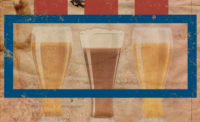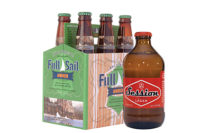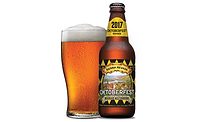Summer is usually prime time for beverage sales. Whether it’s quenching thirsts during outdoor activities or being within reach for additional relaxation, many beverage companies forecast a boost during warmer weather. For Beer Capitol Distributing Co. Inc., Sussex, Wis., summer not only means supplying MillerCoors, Crown Imports LLC, Heineken USA Inc., Pabst Brewing Co., The Boston Beer Co., Mike’s Hard Lemonade Co. and many more brands for backyard barbeques and lakeside getaways, it also means supplying draft and portable packaging for local festivals, the Major League Baseball season and Milwaukee’s Summerfest, which is billed as the world’s largest music festival.
“We have a year-round staff that covers events because of the Bradley Center, State Fair Park and Exposition Center, Frontier Airlines Center and different things like that,” says Aldo Madrigrano, chief executive officer of Beer Capitol. “But really when you get to Summerfest and all the festivals that line up after that, in conjunction with all the games at Miller Park in conjunction with all the fairs and festivals of our churches and municipalities here, it’s crazy. We probably have one of the largest special event equipment groups probably in the Midwest, or the country.”
The beer wholesaler serves a four-county area including Milwaukee and areas north and west of the 33rd largest city in the country. Its territory has a total population of just more than 1.5 million people, according to 2010 U.S. Census Bureau statistics, and varies from urban to suburban to rural, Madrigrano says.
“It truly is a beer city,” Madrigrano says. “As much as people try to say, ‘Get away from the beer and brat as your hometown and what you are,’ it is what we are. And, yet, the uniqueness of the marketplace has changed so much with the arts and everything else that is going on; it’s a great city.”
Local roots
Madrigrano’s family has been in the beverage distribution business in the Milwaukee area for more than 30 years. It first entered the business when Joseph Schlitz Brewing Co. closed its Milwaukee brewery and contacted the family to take over its distribution group in the area, Madrigrano explains. As time passed, the family added several distributorships in the local area including in Kenosha, Wis., and in the Waukesha, Ozaukee and Washington tri-county areas, he says.
Throughout the years, several of the family-owned businesses consolidated under separate Beer Capitol Distributing and W.O.W. Distributing banners. The companies found an opportunity in 2007 to expand its businesses by purchasing three Coors-Pabst-based distributors within its marketplace.
“About six months after we did the Coors deal to pick up Coors in our marketplace, the [joint venture] started with both Miller and Coors, so timing was everything at that point,” Madrigrano notes.
In 2008, the companies purchased Miller Brands-Milwaukee LLC, Wauwatosa, Wis., which coincided with reflection from the 10 partners involved in the two businesses, Madrigrano says. At the time, Beer Capitol was helmed by Madrigrano, some of his relatives and current Beer Capitol President Mike Merriman; W.O.W. Distributing was led separately by Madrigrano and relatives, he explains. During the merge with Miller Brands, Madrigrano, Merriman and their partner Ron Fowler bought the remaining family members out of the business.
Fowler, who is chairman and chief executive officer of San Diego-based Liquid Investments Inc., joined Beer Capitol’s leadership team in 2008. As the owner of several distributors on the West Coast, Merriman says that Fowler adds industry expertise and experience to Beer Capitol’s local knowledge.
In December 2009, Beer Capitol acquired W.O.W. Distributing and merged the two businesses under the Beer Capitol brand in the Sussex, Wis., offices formerly occupied by W.O.W. Distributing. The transaction also saw the companies sell the Dodge County operations of W.O.W. Distributing, Madrigrano says.
To better house its single Beer Capitol operation, the company added 100,000 square feet of office and warehouse space to the Sussex facility, which was completed in October 2010. Moving into one facility helped the company merge its 365 employees, which have come from the various business units Beer Capitol has acquired during the years.
“[It’s] the luxury of getting the best of the best employees out of the operations that we bought,” Merriman says. “We have people in this company that are from every company that we’ve purchased, and we’ve gotten some really good people over the years that way.” Similar to its changing business model, Beer Capitol’s four-county territory has changed throughout the years. Waukesha, which was formerly regarded as a commuter city to Milwaukee, is now home to many larger businesses, Madrigrano explains. Its Washington County market also has transitioned from a rural area to being considered more suburban, he says.
In addition, the local market has seen demographic changes. Madrigrano explains that its Waukesha, Ozaukee and Washington counties used to be about 98 percent Caucasian with the remaining 2 percent made up of various demographics. The areas have since seen an increase in African-American, Asian and Hispanic populations, he says. In its Milwaukee market, the population is more diverse with 2010 statistics showing the make-up of the city’s more than 950,000 people as nearly 61 percent Caucasian, close to 27 percent African-American, 13 percent Hispanic and approximately 3 percent Asian, according to Census Bureau data.
Hometown connection
At the core of Beer Capitol’s business are brands from MillerCoors’ lineup, which make up approximately 73 percent of the wholesaler’s volume, Merriman says. Within that percentage, he notes that Miller Lite accounts for about 18 percent of Beer Capitol’s volume. Coors Light also is a top performer in its portfolio, as are MillerCoors’ Tenth and Blake Beer Co. subsidiary’s Blue Moon brand and Wisconsin-native Leinenkugel’s Summer Shandy release, which Merriman says “has almost become a brand in itself.”
The company maintains open communication with MillerCoors. In fact, Madrigrano explains that there is no “sacred cow” on which the two companies are unable to speak. With its own deep ties to the Milwaukee area, MillerCoors also remains dedicated to the community that Beer Capitol serves. The brewing company maintains a strong presence in the area, including sponsorship of the home of Major League Baseball team the Milwaukee Brewers. Beer Capitol supplies beer to Miller Park and notes that draft and aluminum bottles of MillerCoors brands are top-sellers in the ballpark.
At the music festival Summerfest, which spans two weeks in late June and early July, Miller Lite is the title sponsor of a music stage as well as the Miller Lite Oasis concession area. Summerfest grounds also offer Blue Moon and Leinenkugel’s, as well as Mike’s Hard Lemonade and Milwaukee-based Beer Capitol craft brewery partners Lakefront Brewery and Water Street Brewery.
As its business has grown, Beer Capitol encourages each of its executives to be involved in local organizations, committees, visitor bureaus and chambers of commerce.
“Beer Capitol itself at one time was probably the smallest of all distributors in the marketplace to now being the biggest; we’ve really kept our roots around the different things that go on,” Madrigrano says.
The company maintains a philosophy to give back to the community what the community has done for the company, he notes. In 2011, the company was honored as Waukesha County Business Alliance’s business of the year, Merriman says. Madrigrano notes the importance of the role of its employees — both past and present — in the achievement.
Outside of its local market, Madrigrano, Merriman and additional senior-level executives are part of state-wide organizations and industry-level boards, such as supplier councils and national organizations.
A critical eye
Although Beer Capitol is inextricably linked to its major supplier, Madrigrano highlights MillerCoors’ support of the wholesaler’s portfolio outside of its brands.
“I think what’s best about them now, especially as I look back across the past 25 years and moving forward, really what they’ve come to understand is that working together with us and our different brands besides theirs really makes for a good relationship in the community because there’s gaps that we can fill with our portfolio that they’re not filling with their portfolio at this time,” he explains.
With strong suppliers across all niches of the industry, Beer Capitol runs a tight ship when it comes to welcoming new partners.
“We don’t want to be brand accumulators; we don’t want to just take everybody to take everybody,” Madrigrano says. “The brands that are in our house, and that hopefully down the road will be in our house, are brands that we know we can build with — that both of us together can build the brand.”
He recognizes that this might not be the most common of operating principles adding, “I think that’s what makes us unique: our list isn’t as big as a lot of people, and it’s really that way for a reason. Both us, the craft guys and the import guys understand that we’re together on this.”
When it comes to new partner-ships, Merriman explains that Beer Capitol views its role as follows: “In any conversation — and we’ll visit with anybody — we’re very up front that we’re not going to take your brand unless we have a good understanding about where you want to take your brand, what support you’re going to give it,” Merriman says. “It’s our job to get you into distribution; it’s your job to create the pull.”
The company also is not afraid to terminate partnerships if they are not mutually beneficial, Madrigrano says.
“If we aren’t doing well together then we should figure out how not to, because we’re wasting both of our time,” he explains. “That’s part of the original process that we have to talk to them about. I think they appreciate it because we’re being very up front with them, and if someone really wants to be in the house, typically they’re going to be in the house because their passion’s there.”
Many of Beer Capitol’s craft partners, including The Boston Beer Co. brand Samuel Adams, have embraced its business plan. Jim Koch, founder of The Boston Beer Co., visits with Beer Capitol’s 90-person sales team annually during the wholesaler’s October and November planning meetings to teach the team about the brewery’s brands and upcoming plans, Merriman says.
“For us, the value of having Jim Koch come in here for sure once a year ... and he sits with the guys, from A to Z and now the cicerone training that they’ve incorporated into their program, it’s a very valuable relationship,” he explains.
The company also represents Sierra Nevada Brewing Co., Alaskan Brewing Co., Breckenridge Brewery, and Bell’s Brewery, along with a lineup of Wisconsin craft breweries. Among Beer Capitol’s state-based portfolio are Lakefront Brewing Co., Milwaukee; Capitol Brewing, Madison, Wis.; Steven’s Point Brewing, Steven’s Point, Wis.; Tyranea, Lake Mills, Wis.; Big Bay Brewing, Shorewood, Wis.; and what Merriman dubs a “rising star”: Ale Asylum from Madison.
“We have some great Wisconsin-related beers and we’re just starting to play that angle more and more,” Merriman says. “Some of the chains, Walmart in particular, are going with this homegrown-type philosophy so now they’re pushing Wisconsin-made brands. [Walmart’s] been a great partner in growing some of those brands that, face it, Walmart two years ago would have never even put that on the shelf.”
Retail chains have begun to play a significant role in Beer Capitol’s market, which is in contrast to much of the state of Wisconsin, Madrigrano notes. Its market has recently seen openings of national retailers such as Aldi, Target, Walgreens and CVS, which join local retailers Pick’n Save, Piggly Wiggly, Sendik’s, Sentry Foods, Woodman’s Foods and Otto’s Beverages. Beer Capitol's largest single account is Discount Liquor, owned by Marie and Frank Greguska. Discount Liquor has been a valuable partner for more than 31 years, Madrigrano explains.
Comeback stories
Similar to the cultural resurgence in the Milwaukee area, Beer Capitol has noted the return of brands that once dominated its market. One such example is the recent uptick in the performance of import beer brands, which the company partially attributes to the popularity of craft beer.
The company’s three largest import brands, Corona, Heineken and Hacker-Pschorr, each have endured their ups and downs, but always have had a place in Beer Capitol’s business, Madrigrano says. Hacker-Pschorr and fellow Heineken USA brand Paulaner are growing and remain popular with the area’s population of German descent, Madrigrano says. Appealing to the area’s increasing Hispanic population, Beer Capitol’s portfolio includes Crown Imports brands such as Corona, Modelo Especial and Negra Modelo.
“We’re seeing a great return of volume to Corona,” Merriman says. “If either one of us five years ago would have thought that Modelo Especial was going to be a 200,000 case brand in Milwaukee, we would have had to had our heads examined, but it’s just 20 percent growth over and over.”
The company also is seeing a rise in, as Merriman says “craft beer trapped in an import’s body” brand Negra Modelo, which is available on draft in local accounts.
Also among the strong players in its portfolio are flavored malt beverages from Mike’s Hard Lemonade Co. Madrigrano says Beer Capitol’s footprint has one of the largest per capita consumption rates for the Mike’s brands in the country. He adds that the brand’s plastic packaging is particularly popular with Beer Capitol’s special events business and for consumers who visit local lakes during the summer.
The company also has seen an increase in sales for Seagram’s flavored malt beverages. Beer Capitol also represents another brand with Milwaukee heritage, Pabst, which has experienced its own rebound in the market, Merriman notes.
“Pabst took a big tumble in Milwaukee when they moved out,” he explains. “That’s all gone: the resentment, the bitterness, now you’re seeing that the brand is on fire in the general market and their off-premise business. They’re becoming rock stars in the [Nielsen Co. statistics]; it’s 20-plus growth every week.”
As it keeps up with the evolution in its marketplace and popularity of its portfolio of brands, Beer Capitol continues to benefit from its history in the Milwaukee area, Madrigrano says.
“The neat part about Milwaukee is that people truly understand the brewing business,” he explains. “It’s not just a town where these brands are getting hot or they’re not. [Consumers] really understand it because you can almost go out anywhere you’ve been and talk to somebody whose grandfather, uncle or aunt has worked for one of the breweries at one time.” BI






